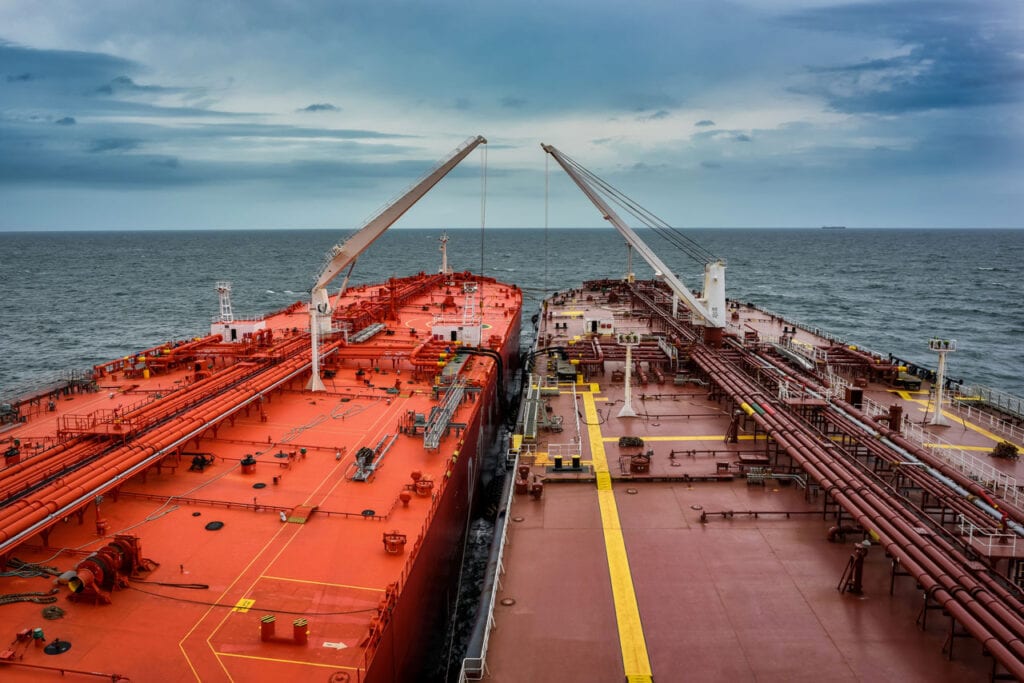Introduction
Ship to Ship Transfers (STS) of bulk liquid cargoes are a common occurrence in the shipping industry. However, the fact that two vessels will be need to be secured alongside each other during an STS operation, usually while at anchor but sometimes while underway, creates some uncommon close proximity risks.
This Risk Bulletin is designed to raise awareness of STS risks together with the applicable MARPOL regulations and industry best practice guidelines. The focus is on MMIA Members who operate tankers and/or tank barges. The goal is to assist Members in minimising their STS risks and optimising their P&I Cover
Background
Inadequately planned and controlled STS operations have resulted in numerous and costly STS incidents with associated P&I claims. These incidents have resulted in oil spills and pollution, crew injuries during mooring and unmooring operations, ship contact/collision damage and fines for breach of regulatory obligations. These STS related issues are discussed below together with practical advice on STS planning and loss prevention.
MMIA P&I Cover for STS Operations
The Rules of the Association do not specifically exclude STS operations in relation to standard cargo operations. However, an STS lightering operation which is part of a salvage, pollution control or wreck removal contract may not be covered unless MMIA is first advised and supplementary cover has been agreed. Members should therefore always check if they have any concerns as to the whether a planned STS operation falls outside the scope of standard cargo operations.
Recommended Publications
As an STS loss prevention starting point, MM recommends that Members ensure all of their tankers engaged in STS cargo transfer operations are provided with the following IMO and industry publications:
- MARPOL Consolidated Ed. 2017 as now updated by the IMO 2020 Supplement.
- IMO Manual on Oil Pollution, Section I, Prevention, 2011 Edition.
- OCIMF Ship to Ship Transfer Guide for Petroleum, Chemicals and Liquefied Gases, 2013 Edition.
- INTERTANKO International Safety Guide for Oil Tankers and Terminals (ISGOTT) 2020 Edition 2020.
- ICS Tanker Safety Guide – Chemicals (2020 Ed. available 1.1.21).
Regulatory Compliance
STS oil cargo transfers involving oil tankers of 150 gross tons or more are, with the exception of STS bunkering, regulated by MARPOL, Annex I, Chapter 8, Regulations 40 to 42. These regulations require all such oil tankers (whether in international or domestic trade) to carry and comply with a detailed and flag state approved STS Operations Plan. The Plan must be in the working language of the ship and may also be incorporated into an existing Safety Management System (SMS).
Note: MARPOL Annex I, Chap 8, and the requirement for an STS Operations Plan do not apply to STS bunkering. Despite this, the risk similarities between STS Oil Cargo Operations and STS Bunkering Operations are clear. This has led to the positive incorporation of the relevant sections of STS Transfer Checklists (as contained in the OCIMF STS Guide) into ISM Code SMS Bunkering Procedures. MM endorses this ‘best practice’ and recommends its application to the ISM Code SMS Bunkering Procedures and SOPEPs referred to in MM Risk Bulletin No. 34.
Oddly, there is no STS Operations Plan requirement under MARPOL Annex II for chemical tankers and related STS chemical cargo transfers. However, the ISM Code (for vessels over 500 GT in international trade) or any equivalent NCVS (Non Convention Vessel Standard) regulation (for vessels in domestic trade) obligate chemical tankers to have flag state approved and detailed procedures available for key operations. This includes STS transfers. As such, chemical tankers should have STS Operations Procedures on board which are effectively equivalent to the STS Operations Plan required for oil tankers.
STS Operations Plan/Procedures Content Overview
The content of the obligatory STS Operations Plan for oil tankers and the equivalent ISM Code/NCVS STS procedures for chemical tankers is required to be based on and incorporate both the regulatory obligations imposed by MARPOL and the ‘best practice’ guidelines provided by the IMO Manual, the OCIMF STS Guide and the other industry publications listed above.
The STS Plan/Procedures should include but are not limited to the following:
Person in Charge – For STS oil transfer, MARPOL Annex I provides that this role falls to the Person in Overall Advisory Control (POAC). In the case of STS LNG/LPG cargoes, MARPOL Annex II provides that the role falls to the STS Superintendent (STSSI). For STS liquid chemical transfer, MARPOL Annex II is silent as to Person in Charge designation but such a person will still need to identified.
The POAC/STSSI should be qualified to perform all relevant duties relating to ship-handling and cargo operations, as detailed in Paras. 1.6 and 1.7 of the OCIMF STS Guide and/or Para. No. 6.2.1.2 of the IMO Manual.
STS Transfer Area – Considerations include sea room, traffic density, water depth and the availability of a safe anchorage. Details can be found at Paras. Nos. 2.3 and 2.4 of the OCIMF STS Guide and Para. No. 6.2.2.1 of the IMO Manual.
Notification to Authorities – MARPOL requires that for all STS within the territorial sea (12 n.mi. from shore) and/or the EEZ (200 n.mi. from shore) the relevant authorities must be notified not less than 48 hrs. in advance. The notification shall comprise the information contained at Para. No. 2.2 of the OCIMF STS Guide and Para. No. 6.2.3.1 of the IMO Manual.
Masters and Members must ensure that acknowledgement and positive approval of the planned STS is provided by the relevant authorities and recorded.
Cargo Handling and Mooring Equipment – Cargo hoses, fenders and mooring lines must all be visually checked and test certificates must be up to date prior to use as required by SOLAS and MARPOL and as recommended by the OCIMF STS Guide at Paras. 9.2 and 9.3.
STS Preparation and Joint Plan of Operation (JPO) – The appointed POAC/STSSI and masters of both tankers should make preparations before commencement of the operation, as detailed in Section No. 5 of the OCIMF STS Guide and Paras. No. 6.4.1 to 6.4.4 of the IMO Manual. A JPO should then be developed and agreed to ensure that all parties involved are of how the operation is to be conducted.
Records of Compliance – Details of all STS cargo operations are to be recorded in the STS Operation Plan, Oil Record Book or Cargo Record Book, as appropriate and the Deck Log. All operational checklists (as provided in the OCIMF STS Guide Appendices) must be completed and retained on board for inspection by Port State or other authorities.
Common STS Loss Incidents and Loss Prevention
Online research reveals that the most common STS incidents relate to contact or collision between the two tankers involved while mooring alongside or during departure. Contributory factors include incorrect approach angle, excessive speed, engine failure, lack of situational awareness in relation to weather conditions and tidal currents and inadequate fendering.
Cargo related losses and spill pollution are also common due to cargo hose failures or damage, cargo valve or line failures and cargo tank overflows due to inadequate crew supervision and inter-ship communications.
Crew injuries and deaths have also occurred in relation to mooring line and fittings breakages as well as slips and falls during crew access from one ship to the other.
In terms of loss prevention, these reported incidents and associated losses were likely all avoidable. As always, the keys to loss prevention are awareness through risk assessment and avoidance through risk management. Access to these keys lies in the preparation of a comprehensive STS Transfer Plan and JPO and their full and coordinated implementation by the appointed POAC/STSSI.
Conclusion and Takeaway
It is recognised by both the IMO and the tanker industry that STS operations can and do generate a significant level of additional risk. As a consequence, STS regulations and guidelines have been specially developed to minimize these risks. However, they provide no value if they are not properly understood and/or not fully and routinely implemented to ensure both regulatory compliance and the observance of industry best practice.
MM’s recommendations to its Members are as follows:
- Ensure that your CPP/Chemical/Gas Tanker managers and masters are provided with a pdf copy of this Risk Bulletin.
- Confirm that all of your MARPOL regulated tankers (i.e. over 150 GT and whether in international or domestic trade) which engage in STS operations are provided with a flag state-approved MARPOL Annex I STS Operations Plans and/or ISM Code or NCVS equivalent STS Operations Procedures.
- Check that all of the tankers referred to at point 2. above are provided with the IMO and tanker industry STS publications recommended in this Risk Bulletin which are relevant to their trade.
- During the process of agreeing on Charterparty terms, ensure the inclusion of a specific indemnity from Charterers for all costs and any damage and loss e.g. ‘All Ship-to-Ship Operations shall be at the Charterers’ risk, cost and expense’.


